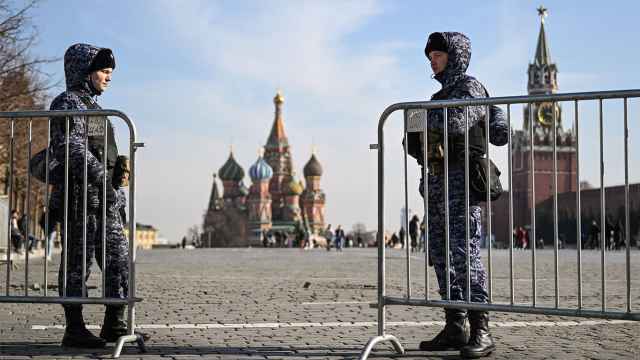BISHKEK, Kyrgyzstan — A prominent human rights group said Monday that Kyrgyzstan's armed forces abetted and may even have actively taken part in violence by ethnic Kyrgyz mobs against the minority Uzbek community that left at least 370 people dead in June.
Human Rights Watch said many witnesses reported seeing individuals in camouflage attacking Uzbeks and using armored military vehicles to remove improvised roadblocks barring entry into Uzbek neighborhoods.
"This pattern raises serious concerns that some government forces either actively participated in, or facilitated attacks on, Uzbek neighborhoods by knowingly or unwittingly giving cover to violent mobs," the report said.
The 91-page report by the New York-based group is the most ambitious attempt to date at an independent survey of the causes and consequences of the clashes, which also sent hundreds of thousands of people fleeing from their homes to neighboring Uzbekistan.
Kyrgyzstan's interim government spokesman Farid Niyazov would not immediately comment on the report, but said the government welcomes the investigation and would continue to cooperate with rights groups to help establish the truth about the unrest.
Senior government representatives have acknowledged that the real death toll may be much higher than the official tally.
Kyrgyzstan is tense ahead of October parliamentary elections called after former President Kurmanbek Bakiyev was driven from power in a bloody uprising in April.
Establishing the origin of the five-day wave of violence that erupted on June 10 has been hindered by sharply diverging testimonies, although international observers largely agree that it rose out of petty interethnic brawls in the southern city of Osh.
Tensions between the two communities are rooted in a rivalry over land in the overpopulated Ferghana Valley, where the violence-wracked cities of Osh and Jalal-Abad are located. While Uzbeks dominated agriculture and owned many lucrative businesses, most government officials and law enforcement officers were ethnic Kyrgyz.
"The conflict is related to the lack of balance, as economic powers were in the hands of Uzbeks, while political power belonged to Kyrgyz," Human Rights Watch researcher Anna Neistat said.
Before the Russian conquest in the 1860s, the Ferghana Valley was part of a feudal state ruled by an Uzbek dynasty. Soviet dictator Josef Stalin assigned part of the valley to the former Soviet Kyrgyz republic, even though ethnic Uzbeks dominated the area.
While the exact death toll remains unknown, and authorities declined to give an ethnic breakdown of those killed, Uzbeks appear to have suffered disproportionately and lost entire neighborhoods to highly coordinated rampages.
Human Rights Watch called for official investigations into the use of military vehicles to attack Uzbek neighborhoods and whether they were being manned by mobs or by armed forces personnel.
"National and international inquiries need to find out just what the government forces did and whether the authorities did everything they could to protect people," said Human Rights Watch researcher Ole Solvang, who co-authored the report.
On several occasions, mobs of ethnic Kyrgyz seized weapons from outnumbered government forces, which only offered brief resistance, the group's investigation found.
The report also issued new claims that ethnic Uzbeks face widespread abuses by security forces as part of a government drive to investigate and punish those responsible for the rioting.
"The investigation goes on with colossal violations, including massive arbitrary detentions of ethnic Uzbeks, unsanctioned searches, threats and frequent beatings," Neistat said at a news conference in Moscow.
The group reports the torture and ill treatment of more than 60 detainees, one of whom died of injuries sustained while in custody.
Observers fear that routine intimidation of the Uzbek minority could ratchet up tensions and lead to a renewed outbreak of violence.
Kyrgyz government officials have admitted that there have been abuses and said they are being investigated, but Human Rights Watch said law enforcement officials based in Osh have dismissed allegations of police abuse.
Over the coming weeks, a 52-member delegation of police advisers working under the auspices of the Organization for Security and Cooperation in Europe is due to be posted in the country, primarily in the turbulent south, to assist local law enforcement maintain the peace.
The group also called on Uzbekistan's authoritarian government to open the border in case of renewed violence. Uzbek authorities briefly blocked the entry of some 100,000 refugees and returned them to Kyrgyzstan within days, sometimes forcibly, said witnesses and rights groups.
"Most of the Uzbeks we interviewed want to leave the country immediately, no matter where to," Neistat said.
A Message from The Moscow Times:
Dear readers,
We are facing unprecedented challenges. Russia's Prosecutor General's Office has designated The Moscow Times as an "undesirable" organization, criminalizing our work and putting our staff at risk of prosecution. This follows our earlier unjust labeling as a "foreign agent."
These actions are direct attempts to silence independent journalism in Russia. The authorities claim our work "discredits the decisions of the Russian leadership." We see things differently: we strive to provide accurate, unbiased reporting on Russia.
We, the journalists of The Moscow Times, refuse to be silenced. But to continue our work, we need your help.
Your support, no matter how small, makes a world of difference. If you can, please support us monthly starting from just $2. It's quick to set up, and every contribution makes a significant impact.
By supporting The Moscow Times, you're defending open, independent journalism in the face of repression. Thank you for standing with us.
Remind me later.





